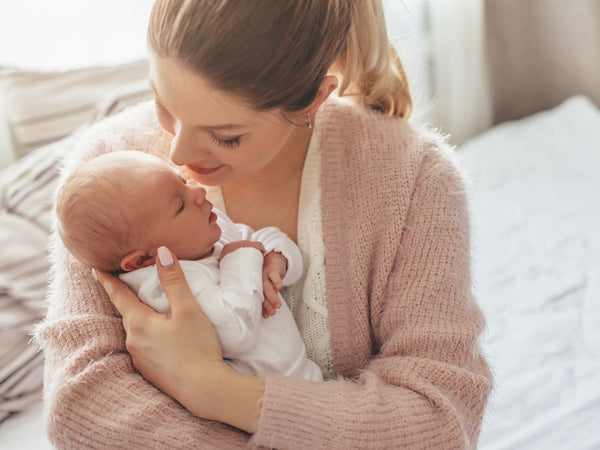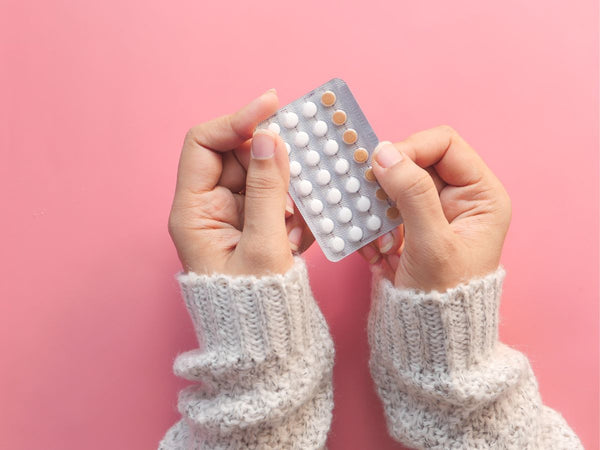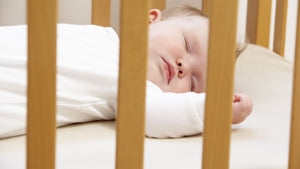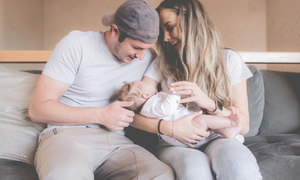Key facts about contraception after birth:
- Contraception can be started from around 3 weeks after birth.
- Couples have choices about what contraception is right for them – there are a range of options.
- No contraception is 100% effective in preventing pregnancy.
But I’ve just had a baby!
If you want to avoid becoming pregnant, you’ll need to decide on an effective form of contraception. You and your partner have choices around what is right for you. The most common forms of contraception recommended after birth are condoms, progestogen only pills or the contraceptive implant.
Many women find they’re not interested in having sex after having a baby and consider contraception to be unnecessary. The general advice from health care providers is to wait at least four – six weeks after birth to allow for healing. A good time to discuss your contraceptive options will be at your postnatal check.

Is this a period or post baby bleeding?
It’s normal to bleed for up to six weeks after having a baby. At first, blood loss (lochia) is heavy and bright red for the first couple of days. Gradually the colour changes to a reddish brown before stopping. Close to two weeks after having a baby, it’s normal to have a whitish discharge which can also be tinged with old blood.
There is no standard pattern of bleeding after having a baby. However, many women find they pass more blood clots than they usually do. They also have a break of a few weeks (or months) after having their baby, before their periods resume.
One way to tell the difference between post baby bleeding and a true period is that lochia can be lighter and more watery. It also smells different to period bleeding.
When to start using contraception after having a baby
Most women are fertile two weeks before their period starts. However, breastfeeding can delay the return of periods, making it hard for women to know with any confidence when their ‘fertile window’ may be. This is why some women conceive again before their periods have come back.
Periods generally return any time from around six weeks to three months after a baby is born. Breastfeeding, formula or mixed feeding affect the timing of when periods return.

Safe contraception if you are breastfeeding
These contraceptive methods are considered safe for breastfeeding women:
The mini pill – Also called the progesterone only pill. It’s important to take the mini pill at exactly the same time each day so it can be up to 99.7 % effective.
Condoms – The male condom is a fine rubber or synthetic sheath worn over the erect penis. Condoms prevent sperm from entering the vagina and uterus. When used perfectly, condoms are 98% effective. The female condom is a soft, rubber like pouch with flexible rings at each end, with one closed end. Female condoms are considered to be 95% effective in preventing pregnancy.
Diaphragm – A type of cap made from silicone which covers the cervix and stops sperm from entering the uterus. When used properly, diaphragms are assessed to be 84% effective.
Contraceptive injection – Commonly called by its trade name ‘Depo-Provera® or ‘Depo Ralovera®. This is a hormonal injection which needs to be given every 12 weeks. When used perfectly, this injection is 99.8% effective.
Implanon – A small plastic rod which is inserted under the skin on the inside of the woman’s upper arm. This contains progesterone which prevents the ovaries from releasing an egg each month. The Implanon implant lasts for three years and is 99.95% effective.
Intrauterine Device – Also called an IUD. This is a small device which is implanted in the uterus. Copper UIDs are designed to last for up to 10 years and progesterone IUDs for up to five years. Copper IUDs are 99.4% effective and Progesterone IUDs are 99.8 % effective.
Permanent sterilisation – For women this is also called tubal ligation or ‘getting the tubes tied’. This is a surgical procedure where the fallopian tubes are cut, blocked and sealed off. For men, permanent sterilisation refers to a vasectomy which involves cutting the tubes in the testes which carry sperm to the penis. Both of the procedures are considered to be 99% effective in preventing pregnancy.
Vaginal ring* – This works in a similar way to the contraceptive pill by releasing hormones which prevent the ovaries from releasing an egg each month. *The vaginal ring is not recommended for women whose baby is aged less than six weeks and who are breastfeeding.

Contraception to avoid if you’re breastfeeding
Avoid using any contraception which contains oestrogen if you are breastfeeding. The vaginal ring and the combined (oestrogen and progesterone) pill are not recommended for breastfeeding women, unless their baby is at least six weeks old. This is because oestrogen can reduce breastmilk supply.
Is breastfeeding a safe contraceptive?
Breastfeeding can be an effective means of contraception as it delays the return of ovulation and periods. There is still a risk you could fall pregnant when you are breastfeeding and you may choose to use other, more effective means of contraception.
To lessen your risk of conceiving when breastfeeding ensure all of these:
- You are breastfeeding frequently and regularly.
- Your baby is younger than 6 months old.
- Your baby is being fed ‘on demand’ both night and day without a space of more than 4 hours between feeds.
- Your periods have not returned.
Emergency contraception
Also called the ‘morning after’ pill, the emergency contraceptive pill needs to be taken as soon as possible, (not necessarily in the morning) after having unprotected sex. There are two types of pills which are available from pharmacies and which don’t require a doctor’s prescription.
- Ulipristal (UPA-EC) - can be taken up to 5 days after unprotected sex. It is not recommended when breastfeeding.
- Levonorgestrel (LNG-EC) - can be taken up to 3 days after unprotected sex.
Before starting contraception
Make sure you’re not pregnant. Do a pregnancy test and speak with your GP or healthcare provider if you’re unsure. Discuss with your partner what is right for you both.
Effectiveness, convenience, cost and lifestyle are all important considerations when making contraception decisions if you want to avoid an unplanned pregnancy.
For more information about contraception after birth:
Speak with your GP, midwife or maternity care provider.
You can also check:
Contraception | Family Planning NSW (fpnsw.org.au)Family Planning Australia
Call - Family Planning Talk Line – 1300 658 886
What is contraception? – Play Safe (nsw.gov.au)
About the Author:
Written for Nourish Baby by Jane Barry. Jane has qualifications in general, paediatric, immunisation, midwifery and child health nursing. She holds a Bachelor Degree in Applied Science (Nursing) and has almost 35 years specialist experience in child health nursing. She is a member of a number of professionally affiliated organisations including AHPRA, The Australasian Medical Writer’s Association and Australian College of Children and Young People’s Nurses.
References
Contraception - female (internal) condoms - Better Health Channel
Our Products
-

01. Guide to a Healthy Pregnancy
$55 -

02. Positive Birthing Course
$55 -

03. Baby Feeding Guide
$55 -

04. Baby Sleep Guide - First 12 Months
$55 -

05. Positive Parenting Course 1 - 3 Years
$55
-
 Is it normal for babies to be noisy?
Is it normal for babies to be noisy?
 Recently we asked Natalie van Winckel, Senior Early Parenting Sleep Consultant and Education Lead from Nourish Baby and Safe Sleep Space, to share her insights into what separates noisy babies from others who are less vocal.
Recently we asked Natalie van Winckel, Senior Early Parenting Sleep Consultant and Education Lead from Nourish Baby and Safe Sleep Space, to share her insights into what separates noisy babies from others who are less vocal. -
 Contraception after birth
Contraception after birth
Most women are fertile two weeks before their period starts. However, breastfeeding can delay the return of periods, making it hard for women to know with any confidence when their ‘fertile window’ may be. This is why some women conceive again before their periods have come back.





 Is it normal for babies to be noisy?
Is it normal for babies to be noisy?
 Contraception after birth
Contraception after birth








